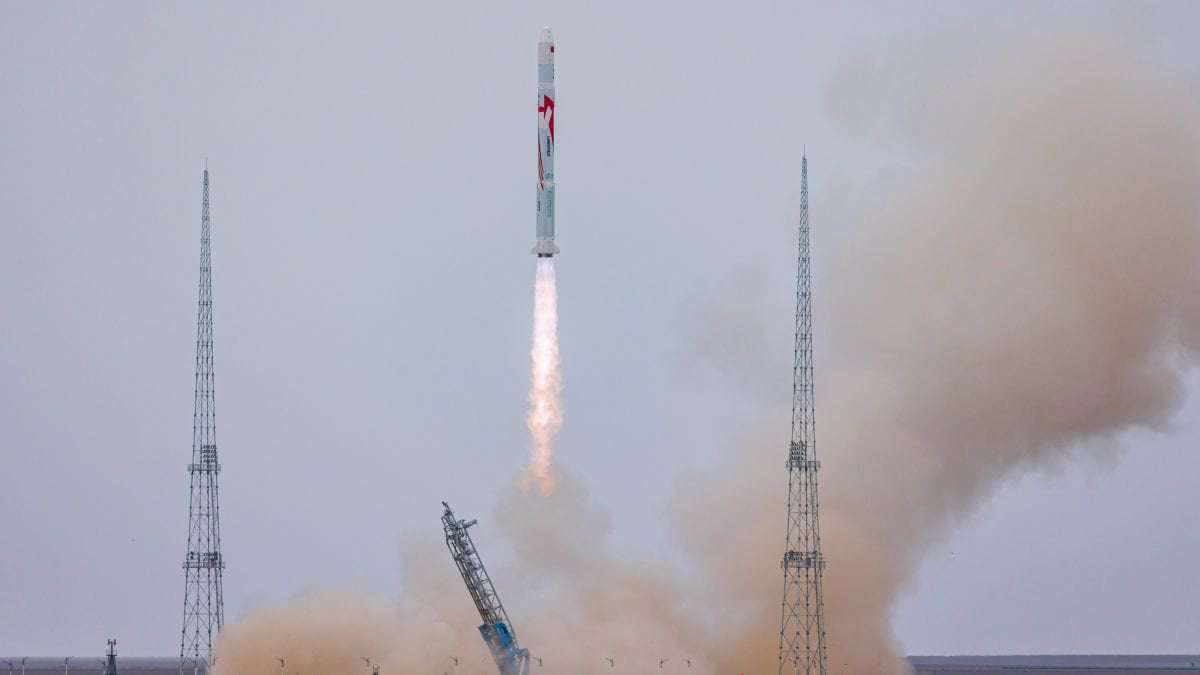A methane-fueled rocket just reached Earth orbit for the first time ever.
The Zhuque-2 rocket, developed by Chinese company Landspace, successfully soared to orbit after launching from the Jiuquan Satellite Launch Center in the Gobi Desert on Tuesday (July 11) at 9 p.m. EDT (0100 GMT or 9 a.m. local time on July 12).
U.S. Space Force tracking confirmed Chinese reports that the methane-fueled rocket made it to orbit, tweeted astrophysicist and satellite tracker Jonathan McDowell.
It was a milestone effort for Zhuque-2, which suffered an anomaly during its debut flight on Dec. 14, 2022. Beijing-based Landspace issued a statement shortly thereafter confirming that the second stage of the rocket was lost (along with a clutch of satellites) and that an investigation would ensue to find the cause, which has not yet been released.
Related: The environmental impact of rocket launches: The 'dirty' and the 'green'
Landspace's methane-fueled Zhuque-2 rocket blasts off from China's Jiuquan Satellite Launch Center on July 12, 2023. (Image credit: VCG via Getty Images))
Methane, aside from burning with a pretty blue color during launch, has been billed by advocates as being more environmentally friendly. While methane is a greenhouse gas, it is cleaner than the standard RP-1 (kerosene) used in many rockets.
Zhuque-2's colorful plume caught a lot of attention on Twitter.
📸Wow! Close-up look at Zhuque-2 Y2 launch. Nice shot of the methane CH4 flame. Credit: LandSpace, @byspto pic.twitter.com/rVBOMHXfn6July 12, 2023 See more
😮Wow! Such a unique angle to watch a rocket launch. Bird view of Zhuque-2 Y2 methane rocket launch shot by a drone right above the launch pad. Full HD: https://t.co/fACfZOvEO0 https://t.co/FdgI1NMo6O pic.twitter.com/Pz3oSlBLGFJuly 12, 2023 See more
📸Photos of Zhuque-2 Y2 launch today. Source: https://t.co/VQrkixB4Hh pic.twitter.com/5aNFWsgFIzJuly 12, 2023 See more
More neat photos of LANDSPACE's Zhuque-2 Y2 https://t.co/ICqbkaqfKs https://t.co/JmHbcJS27X pic.twitter.com/CVpSiw4cmhJuly 12, 2023 See more
Many U.S. companies are working on methane-fueled rockets as well, including SpaceX with its Starship system, Blue Origin with New Glenn, Rocket Lab with Neutron, United Launch Alliance with Vulcan Centaur and Relativity Space with its Terran line. Some of these vehicles have suffered issues in recent months, however.
Terran 1 failed to reach orbit on its debut launch in March, for example, and SpaceX issued a self-destruct command to Starship during its first fully stacked launch in April after the vehicle suffered several anomalies. (SpaceX is developing Starship to help settle Mars, and methane fuel can be sourced on the Red Planet, company founder and CEO Elon Musk has stressed.)
Vulcan Centaur was supposed to fly for the first time in early May, but that liftoff has been delayed after an anomaly occurred during testing of the rocket's upper stage.
Blue Origin's New Glenn development is also uncertain following reports Tuesday (July 11) that one of the company's BE-4 rocket engines exploded during testing in late June.
The BE-4 engine not only powers New Glenn, but also the first stage of Vulcan Centaur. More information about impacts to the two vehicles may come during an already-scheduled phone call with reporters Thursday (July 13) by ULA CEO and President Tory Bruno concerning progress of his company's rocket.
China and its private space companies have been on a tear in terms of launches, taking 54 missions to orbit in 2022 and targeting more than 60 in 2023. By comparison, SpaceX (by far the busiest U.S. launcher) launched 61 rockets to space in 2022.

Magicalsandwichpress on July 18th, 2023 at 22:20 UTC »
There is got to be more to it than that, no way launch provider is going through all that for a slightly more environmentally friendly fuel. How does the launch cost compare?
detachedshock on July 18th, 2023 at 19:06 UTC »
China's space industry is actually pretty interesting; the CNSA has done some great work with Chang'e and Tianwen and both i-Space and LinkSpace (original names..) are rivaling US private industry. I don't really know much about the others, but they all have developed exceptionally fast.
I doubt the Chinese government cares about the environment with regards to the space industry (given the dumping of first stages in the countryside and subsequent leaking of hydrazine), but the pursuit of methalox is probably in part to rival the US but in that its easier to store methane than liquid hydrogen plus reusability seems to be a common goal. But its nice to see them moving on from the nasty hydrazine and nitrogen tetraoxide.
I don't really see much of this as competition between the US and China, since I feel like most launch companies are already competing against other domestic providers.
Aggravating_Boy3873 on July 18th, 2023 at 17:21 UTC »
Oh cool, good for them. Tech advancement is mostly good for mankind.